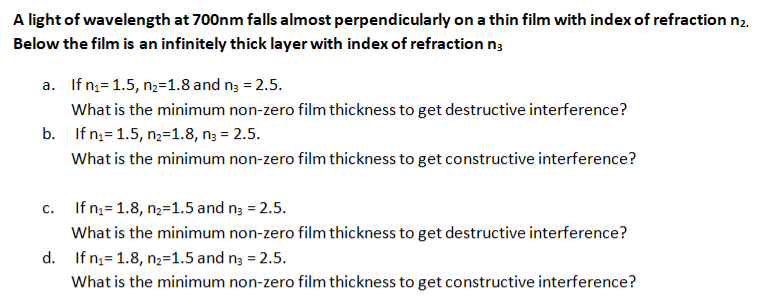A light of wavelength at 700nm falls almost perpendicularly on a thin film with index of refraction n₂. Below the film is an infinitely thick layer with index of refraction n a. If n₁1.5, n₂=1.8 and n3 = 2.5. What is the minimum non-zero film thickness to get destructive interference? b. If n₁1.5, n₂=1.8, n3 = 2.5. What is the minimum non-zero film thickness to get constructive interference? c. If n₁1.8, n₂=1.5 and n3 = 2.5. What is the minimum non-zero film thickness to get destructive interference? d. If n₁1.8, n₂=1.5 and n3 = 2.5. What is the minimum non-zero film thickness to get constructive interference?
A light of wavelength at 700nm falls almost perpendicularly on a thin film with index of refraction n₂. Below the film is an infinitely thick layer with index of refraction n a. If n₁1.5, n₂=1.8 and n3 = 2.5. What is the minimum non-zero film thickness to get destructive interference? b. If n₁1.5, n₂=1.8, n3 = 2.5. What is the minimum non-zero film thickness to get constructive interference? c. If n₁1.8, n₂=1.5 and n3 = 2.5. What is the minimum non-zero film thickness to get destructive interference? d. If n₁1.8, n₂=1.5 and n3 = 2.5. What is the minimum non-zero film thickness to get constructive interference?
College Physics
10th Edition
ISBN:9781285737027
Author:Raymond A. Serway, Chris Vuille
Publisher:Raymond A. Serway, Chris Vuille
Chapter24: Wave Optics
Section: Chapter Questions
Problem 3P: Light at 633 nm from a helium-neon laser shines on a pair of parallel slits separated by 1.45 105 m...
Related questions
Question
Optical Physics - Interference, Diffraction and Polarization of waves
Please highlight the formula that are needed and write solutions neatly and completely. For study purposes.

Transcribed Image Text:A light of wavelength at 700nm falls almost perpendicularly on a thin film with index of refraction n₂.
Below the film is an infinitely thick layer with index of refraction n3
a. If n₁=1.5, n₂=1.8 and n3 = 2.5.
What is the minimum non-zero film thickness to get destructive interference?
b. If n₁1.5, n₂=1.8, n3 = 2.5.
What is the minimum non-zero film thickness to get constructive interference?
If n₁= 1.8, n₂=1.5 and n3 = 2.5.
What is the minimum non-zero film thickness to get destructive interference?
d. If n₁1.8, n₂=1.5 and n3 = 2.5.
What is the minimum non-zero film thickness to get constructive interference?
C.
Expert Solution
This question has been solved!
Explore an expertly crafted, step-by-step solution for a thorough understanding of key concepts.
Step 1: Determine the given data:
VIEWStep 2: a. Calculate the minimum thickness of destructive interference:
VIEWStep 3: b. Calculate the minimum thickness of consuctive interference:
VIEWStep 4: c. Calculate the minimum thickness of destructive interference:
VIEWStep 5: d. Calculate the minimum thickness of constructive interference:
VIEWSolution
VIEWStep by step
Solved in 6 steps with 6 images

Follow-up Questions
Read through expert solutions to related follow-up questions below.
Follow-up Question
How do you determine the values to put in 'm'?
Solution
Knowledge Booster
Learn more about
Need a deep-dive on the concept behind this application? Look no further. Learn more about this topic, physics and related others by exploring similar questions and additional content below.Recommended textbooks for you

College Physics
Physics
ISBN:
9781285737027
Author:
Raymond A. Serway, Chris Vuille
Publisher:
Cengage Learning

College Physics
Physics
ISBN:
9781305952300
Author:
Raymond A. Serway, Chris Vuille
Publisher:
Cengage Learning

Physics for Scientists and Engineers: Foundations…
Physics
ISBN:
9781133939146
Author:
Katz, Debora M.
Publisher:
Cengage Learning

College Physics
Physics
ISBN:
9781285737027
Author:
Raymond A. Serway, Chris Vuille
Publisher:
Cengage Learning

College Physics
Physics
ISBN:
9781305952300
Author:
Raymond A. Serway, Chris Vuille
Publisher:
Cengage Learning

Physics for Scientists and Engineers: Foundations…
Physics
ISBN:
9781133939146
Author:
Katz, Debora M.
Publisher:
Cengage Learning

Principles of Physics: A Calculus-Based Text
Physics
ISBN:
9781133104261
Author:
Raymond A. Serway, John W. Jewett
Publisher:
Cengage Learning

Physics for Scientists and Engineers, Technology …
Physics
ISBN:
9781305116399
Author:
Raymond A. Serway, John W. Jewett
Publisher:
Cengage Learning

University Physics Volume 3
Physics
ISBN:
9781938168185
Author:
William Moebs, Jeff Sanny
Publisher:
OpenStax